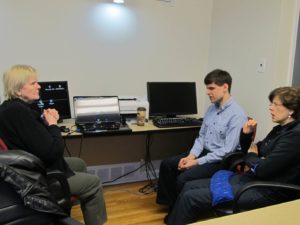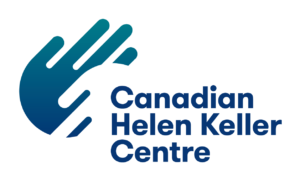Programs and Services Offered at CHKC
CHKC offers a wide variety of Training Programs and Seniors Services to individuals who are deafblind.
All Programs and Services are funded by the Ministry of Community and Social Services for Ontario Residents. For individuals living outside of Ontario, services are available on a fee for service basis.
Workshops
Full or half day workshops are based on core programing that is offered at CHKC in a larger group setting. This format allows for more peer involvement and group discussions which prove beneficial to achieving the goals of the individual. The workshop topics are developed based on current programing as well as consumer feedback regarding their own interests and training goals.
Some workshop topics might include:
- Go Transit and Presto
- Understanding your hearing and vision loss
- Sexual Health
- Everyday Apps
Residential Training Program
CHKC’s residential program is an intensive training program that is free of charge for individuals who are deaf-blind who live in the province of Ontario. Individuals who participate in this program stay at the Training Centre from 1 to 3 weeks and have specific learning goals that are achieved through a daily schedule of a mixture of one on one training, workshops and clubs.
Clubs
CHKC clubs are programing that happen on an ongoing basis and have social and educational components with lots of peer to peer interactions. These clubs occur in a more informal situation where there is a facilitator rather than an instructor, this allows people to bounce ideas off of each other and learn from shared experiences.
Some clubs offered at the Centre are:
- iOS club
- Cooking Club
- Guide Dog Club
One on One Instruction:
Adapted Communication Systems
- American Sign Language (ASL): This course teaches you how to communicate in ASL expressively and receptively through learning signs, sentences, grammar, and common ASL phrases.
- Tactile American Sign Language: In this course you will practice how to receive ASL through hand over hand touch.
- Langue des signes québécoise (LSQ): LSQ is a cross between American Sign Language and French Sign Language.
- 2-Hand Manual: This course teaches you how to use the 2-Hand manual alphabet through receiving and expressing words and sentences.
- Cochlear Implant Rehabilitation: This course will help those who have a Cochlear Implant use their device more effectively. This will happen through practice audio programs and worksheets.
Braille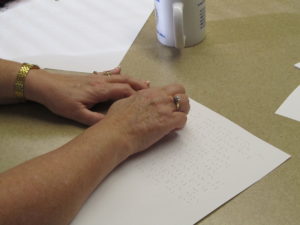
- Uncontracted Braille: In this course you learn how to read and write uncontracted Braille (formerly known as Grade 1 Braille).
- Contracted Braille: This course teaches commonly used Braille contractions (Formerly known as Grade 2 Braille).
Orientation and Mobility
- General Orientation and Mobility Course: Learn how to orient yourself in your environment through identifying locations, obstacles and objects using techniques such as search patterns and environmental cues.
- Winter Travel: This course focuses on the specific tools needed to travel safely and independently in the winter months. It shows consumers how to travel safely with icy conditions, and how to use sighted guide effectively during the winter.
- Mobility Aids: This class is for those interested in knowing more about different mobility tools through learn about different types of canes and canes tips, how to do basic cane repairs, how to get a new cane through ADP, GPS devices, safety tips for travel and tactile maps.
- Using a Guide Dog: This course focuses on individuals who have a guide dog, or who are thinking of going through the process of getting a guide dog. You will learn about what guide dogs do, who will pay, safety with guide dogs etc.
Home Management
- Cleaning: This course teaches you how to properly clean areas around the house with little or no vision. For example; grid pattern cleaning and tactile cues.
- Laundry: In this course you learn how to wash clothes, sheets and towels, how to separate clothes with limited vision, and how to use the washing machine and the dryer.
- Shopping: This course teaches you how to become comfortable when shopping. This is done through teaching you how to make shopping lists, how to look for sales and how to use coupons.
- Managing a Home: This course teaches you about home safety and maintenance, it talks about how to make the different areas of your house, safer, clean and easier to live in.
- Household Organization Tips: The course shows different systems to organize your home. This is done through teaching tactile labeling, Braille labeling, and finding/identifying food in fridge/freezer.
- Lawn Care Skills Training: This seasonal course focuses on the skills necessary to care for lawns. Skills learned include: lawn cutting, aerating, seeding, fertilizing, tree trimming, and tool maintenance.
- Lighting: In this course you will learn different types of lighting, discuss problems associated with lighting and low vision, and have concrete examples of different kinds of lighting.
- Accessible Gardening: This course shows participants the ways to make gardening accessible for individuals who are deaf-blind. The class will also show how a gardening space can be adapted for individuals with mobility issues.
Food Management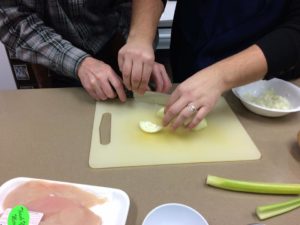
- Cooking and Safe Food Handling: An introduction on how to plan and cook meals. It emphasizes safe handling of food and tools used in cooking such as knife skills and hot liquids.
- Nutrition and Understanding the Canadian Food Guide: This course is about the foods you should and should not eat to be healthy. It also shows you how to make these foods and where to buy the ingredients at low cost.
- Food Storage: In this course you will focus on the difference between perishable and non- perishable foods and how to store the two. It focuses on ways to label and store different foods to make it as safe as possible.
Personal Management
- Grooming: This course teaches grooming techniques such as shaving and putting on make-up.
- Clothing Care: This course teaches how to properly take care of your clothes, shoes and other personal items.
Money Management
- Budgeting: In the course, you learn how to manage money. This is done through: organizing bills, making a payment schedule, using your bank accounts, introduction to large print cheques, cheque guides and money counters.
- Online Banking: In this course individuals will learn how to access their banking information on the internet through learning how to see your account balance, pay bills and transfer money.
Community Participation
- Using your Intervenor: This course teaches individuals about the role of an Intervenor. It discusses: how to book an Intervenor, examples of when Intervenors can be used, effective use of intervention time and consumer/Intervenor responsibilities.
- Knowing your Rights: This course focuses on knowing the rights of people who are deaf-blind. In this course you will learn how to set a goal and who can help you achieve these goals as well as Human Rights and disability law and how it relates to people who are deaf-blind
- AODA/Human Rights Code: This course teaches people about the Accessibility for Ontarian with Disabilities Act and the Human Rights Code and why they are important to know about for people who are deaf-blind.
- Deafblindness and the Effect on Loved Ones: This course focuses on the ways in which families can understand and help those who are deafblind. This includes practical tips on how to live with people with vision and hearing loss as well as simulations to better understand what their family members are dealing with.
Technology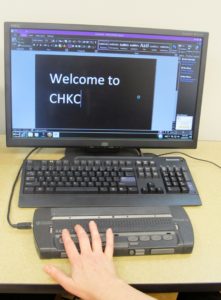
- General Computer Skills: This course focuses on how to use computers with assistive technology software as well as basic computer skills such as: using a keyboard, word processing, screen magnifiers, speech reading software, Braille output, internet security and email.
- Apple Devices: This course focuses on devices made by Apple Inc. such as iPads, iPhones, iPod and MacBooks and how they can be adapted for those with vision and hearing loss.
- Android Devices: This course focuses on devices that run the Android Operating System. This includes both cell phones and tablets..
- Technical Devices: This course teaches different technical devices that are available for individuals who have vision and hearing loss and the ways they can connect to your primary devices to make them more accessible.
- Assistive Devices Program (ADP): You will learn about the different categories related to vision and hearing devices, as well as how to apply and when you are able to receive them.
- Deaf-blind Friendly Apps: In this course you will learn about apps for Apple and Android devices that are low-vison friendly, apps you can access through a braille device, and apps in the area of communication, accessing information and education.
